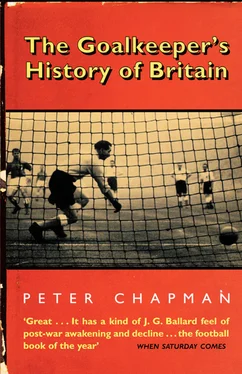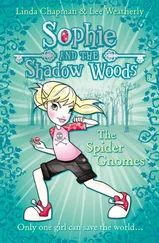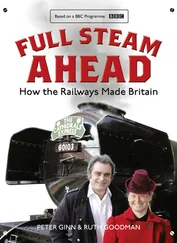The Goalkeeper’s History of Britain
PETER CHAPMAN

Dedication Dedication Epigraph 1. A Determined and Heroic Defence 2. More Flash than Harry 3. In Swift’s Succession 4. End of Empire 5. Neck on the Block 6. Into the Fire 7. Booked 8. The Distant Orient 9. Death on the Cross 10. Highways, Cemeteries, Cleansing and Baths 11. The Demise of Old Industrial Britain 12. On to the Pole 13. Long Game 14. Um Goleiro Inglês 15. Nation of Shotstoppers Select Bibliography Index Acknowledgements About the Author Copyright About the Publisher
For Marie, Alex and Pepito,
my mum and dad,
Maria and Marie I.
Epigraph Epigraph 1. A Determined and Heroic Defence 2. More Flash than Harry 3. In Swift’s Succession 4. End of Empire 5. Neck on the Block 6. Into the Fire 7. Booked 8. The Distant Orient 9. Death on the Cross 10. Highways, Cemeteries, Cleansing and Baths 11. The Demise of Old Industrial Britain 12. On to the Pole 13. Long Game 14. Um Goleiro Inglês 15. Nation of Shotstoppers Select Bibliography Index Acknowledgements About the Author Copyright About the Publisher
‘… a nation of goalkeepers’
Napoleon I, speaking of the British (later misquoted)
Cover
Title Page The Goalkeeper’s History of Britain PETER CHAPMAN
Dedication Dedication Dedication Epigraph 1. A Determined and Heroic Defence 2. More Flash than Harry 3. In Swift’s Succession 4. End of Empire 5. Neck on the Block 6. Into the Fire 7. Booked 8. The Distant Orient 9. Death on the Cross 10. Highways, Cemeteries, Cleansing and Baths 11. The Demise of Old Industrial Britain 12. On to the Pole 13. Long Game 14. Um Goleiro Inglês 15. Nation of Shotstoppers Select Bibliography Index Acknowledgements About the Author Copyright About the Publisher For Marie, Alex and Pepito, my mum and dad, Maria and Marie I.
Epigraph Epigraph Epigraph 1. A Determined and Heroic Defence 2. More Flash than Harry 3. In Swift’s Succession 4. End of Empire 5. Neck on the Block 6. Into the Fire 7. Booked 8. The Distant Orient 9. Death on the Cross 10. Highways, Cemeteries, Cleansing and Baths 11. The Demise of Old Industrial Britain 12. On to the Pole 13. Long Game 14. Um Goleiro Inglês 15. Nation of Shotstoppers Select Bibliography Index Acknowledgements About the Author Copyright About the Publisher ‘… a nation of goalkeepers’ Napoleon I, speaking of the British (later misquoted)
1. A Determined and Heroic Defence
2. More Flash than Harry
3. In Swift’s Succession
4. End of Empire
5. Neck on the Block
6. Into the Fire
7. Booked
8. The Distant Orient
9. Death on the Cross
10. Highways, Cemeteries, Cleansing and Baths
11. The Demise of Old Industrial Britain
12. On to the Pole
13. Long Game
14. Um Goleiro Inglês
15. Nation of Shotstoppers
Select Bibliography
Index
Acknowledgements
About the Author
Copyright
About the Publisher
Chapter 1
A Determined and Heroic Defence
At the top of the street was a stretch of waste ground, a memorial in bumps and ruts to where the barrage balloon had flown. There hadn’t been another one for miles. Attached by cable to an air force lorry, it was lowered during the day, my mum told me, to be checked for signs of damage and deflation by the two airmen in charge of it. They sent it up again at night, its job to deflect any bombers that had overshot their main targets of the City and the docks. It had played its part in what all reports said had been a determined and heroic defence.
Ten years after the end of the conflict, signs of it were all around. Numbers 8 and 10, which stood next to each other on the canal side of the street opposite us, were a half shell of their original selves. From a padlocked gate in the railings, steps ran down into a basement area virtually covered with rubble to the pavement level. The weed-and tree-strewn interiors were home to a colony of cats, large enough in size and number to scare off the packs of stray dogs that wandered the street and surrounding area. The cats were fed by Mrs Clements, the elderly lady who lived on the top floor of our house. Three times a day she would rattle down four flights of stairs and across the road with tins of sour-smelling liver and fish relayed to her on their bikes by the competing catsmeat men of Frome Street and Camden Passage. In anticipation of her first delivery of the day, the cats would yowl through the pre-dawn hours.
A few doors down from us, all that remained of number 25 was a gap in the terrace. The 8 foot drop into what had been its basement was barred only by a few lengths of scaffold board and pole. The blind man on his way back home from work had no problem tapping his way past, but you wondered about the various male members of the Bray family who lived further down. On Saturday nights, they reeled and stumbled on their way home from post-licensing hours sessions in the York public house at the top of Duncan Street near the Angel. They shouted abuse at their wives, who attempted to remain a discreet distance in front of them.
Our street ran down from Colebrooke Row, which curved the quarter mile between City Road and Islington Green. Some Colebrooke Row houses had no railings around them, only stubs of iron a couple of inches long. My mum said they had been removed as soon as the war began, to be made into guns and ammunition. Both corners of Colebrooke Row and the street at our back, Gerrard Road, were wartime bombsites, used for bonfires on Guy Fawkes’ night. The stretch of waste ground where the barrage balloon had flown was right opposite the bombsites but never used for the occasion. This was possibly out of respect for the priest and nuns of St John’s, the red-brick Catholic church behind it, though no one openly made the religious connection. Irish and Italian families in the area threw rubbish and bits of unwanted furniture on the bonfires like everyone else.
Otherwise the Gerrard Road bombsites had no great use. They were certainly too rough for football or any other ball game. Encouraged by a fall of snow and reports that ice hockey was the fastest game in the world, I tried to emulate the Harringay Racers with two bits of wood knocked together by my grandad into a flat-bottomed stick. After two minutes trying to assert control over a few stones, I fell over and took a piece out of my right calf on some glass. I filled it with Germolene, a treatment my dad had applied after he had been bitten in the stomach one night by a large centipede when he was with the army in Sicily. A pink skin had formed over the hole in my leg by the morning. Harringay Racers disappeared no less miraculously soon after.
Playing with a ball in the street was largely confined to the walls of the houses at the very top. Both were used as factories and, for some reason long preceding the war, their windows had been bricked up. One belonged to Lowe’s the printers. My mum, who had been trained as a bookbinder, worked there on and off for some years. Mr Lowe had the shape of the Michelin man and the public demeanour of the Laughing Policeman. In slimmer yet grimmer times he had been a soldier with the Czechoslovakian army. After the Germans had taken over his country in 1938, his unit underwent a stage-by-stage retreat to England. He, his wife and two young daughters lived on the floor above his factory. They were Jewish. Other than sensing that no one else in the street was, I had little idea what this meant.
Читать дальше













